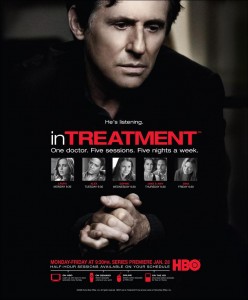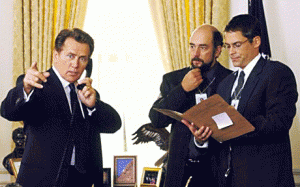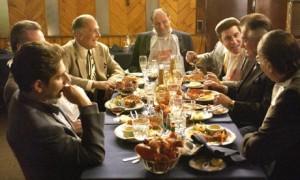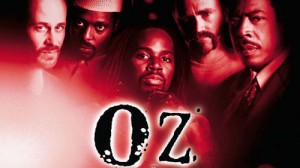TV is known as a better place for writers than any of the other dramatic media, with the sole exception of the theater, of course. Besides, TV drama is nowadays so highly regarded that it is already changing some of the old rules regarding old industry traditions. The crossover of the boundary between cinema and TV, whereby writers can move once again from one medium to the other, with greater ease, is one of the changes. It remains to be seen whether the crossover experiment will affect the writer’s importance in other media too – especially in film.
Tag: Christina Kallas
 So how can you stay true to yourself as a writer, especially when one is supposed to be imitating another writer’s voice? For one thing, one can stop chasing fads or writing what one think the showrunner might want to see. Jane Espenson, who has written for Buffy the Vampire Slayer, Battlestar Galactica and Game of Thrones and has also created her own Web TV show, Husbands, talks to me about how important it is to trust your own instincts and your own good taste. She is not the only one: Jenny Bicks encourages “writing what you want to write, going towards the love” and Tom Fontana goes as far as to very simply state that “being successful is being faithful to oneself.”
So how can you stay true to yourself as a writer, especially when one is supposed to be imitating another writer’s voice? For one thing, one can stop chasing fads or writing what one think the showrunner might want to see. Jane Espenson, who has written for Buffy the Vampire Slayer, Battlestar Galactica and Game of Thrones and has also created her own Web TV show, Husbands, talks to me about how important it is to trust your own instincts and your own good taste. She is not the only one: Jenny Bicks encourages “writing what you want to write, going towards the love” and Tom Fontana goes as far as to very simply state that “being successful is being faithful to oneself.”
By Christina Kallas
 One thing’s for sure: people don’t go to writing to be rewritten. But they still are, first and foremost by the showrunner. The showrunner is the writer who tells the writers what to do, and who will eventually do it herself.
One thing’s for sure: people don’t go to writing to be rewritten. But they still are, first and foremost by the showrunner. The showrunner is the writer who tells the writers what to do, and who will eventually do it herself.
So should a showrunner polish the final draft of every episode to preserve the “voice” of the series, or should each individual writer be allowed to use their voice to bring out new sides to the characters and the series?
By Christina Kallas
 Paddy Chayefsky once wrote that “television is an endless, almost monstrous drain” (The Television Plays, 1955.) And he continued: “How many ideas does a writer have? How many insights can he make? How deep can he probe into himself, how much energy can he activate?” Furthermore, “he (the writer) has no guarantee that his next year will be as fruitful. In fact most writers live in a restrained terror of being unable to think up their next idea. Very few television writers can seriously hope to keep up a high-level output for more than five years.”
Paddy Chayefsky once wrote that “television is an endless, almost monstrous drain” (The Television Plays, 1955.) And he continued: “How many ideas does a writer have? How many insights can he make? How deep can he probe into himself, how much energy can he activate?” Furthermore, “he (the writer) has no guarantee that his next year will be as fruitful. In fact most writers live in a restrained terror of being unable to think up their next idea. Very few television writers can seriously hope to keep up a high-level output for more than five years.”
By Christina Kallas
 The comparison with a novel or with watching a very long movie is a good one for yet another reason: serialization means that you cannot watch the episodes in whichever order they reach you. You have to watch the whole season as if you were watching a 12-hour movie. Terence Winter, creator of Boardwalk Empire and one of the writers for The Sopranos) talks about how the effort still goes towards ensuring that each episode may stand alone, as if it were a mini-movie. So when you just happen to watch this one it still has its own beginning, middle and end, and it makes sense. But it’s like one chapter in a book. To really appreciate it you have to watch the whole series, as you would read a book.
The comparison with a novel or with watching a very long movie is a good one for yet another reason: serialization means that you cannot watch the episodes in whichever order they reach you. You have to watch the whole season as if you were watching a 12-hour movie. Terence Winter, creator of Boardwalk Empire and one of the writers for The Sopranos) talks about how the effort still goes towards ensuring that each episode may stand alone, as if it were a mini-movie. So when you just happen to watch this one it still has its own beginning, middle and end, and it makes sense. But it’s like one chapter in a book. To really appreciate it you have to watch the whole series, as you would read a book.
By Christina Kallas
 So should we be discussing TV series as nothing less than long cinematic narratives? And if so, what would that mean? It is fair to say that TV, just half the age of film, has only recently (perhaps in the last 15 years) come into its own. Writers have only recently learned to take advantage of the unique powers of the medium itself. For years the focus was on each episode being a complete story, a standalone. Not only in procedurals but in series generally, the dramatic focus was on the unit of the episode. A TV episode was a mini-movie (much as a web episode is a mini-TV episode now). Then the primary canvas of the TV medium became the season.
So should we be discussing TV series as nothing less than long cinematic narratives? And if so, what would that mean? It is fair to say that TV, just half the age of film, has only recently (perhaps in the last 15 years) come into its own. Writers have only recently learned to take advantage of the unique powers of the medium itself. For years the focus was on each episode being a complete story, a standalone. Not only in procedurals but in series generally, the dramatic focus was on the unit of the episode. A TV episode was a mini-movie (much as a web episode is a mini-TV episode now). Then the primary canvas of the TV medium became the season.
By Christina Kallas
 The prevailing idea is that film, like any other art form, is made by a single genius. TV drama is, however, more often than not the result of collaboration between many writers and minds. How is that possible, and what does it mean?
The prevailing idea is that film, like any other art form, is made by a single genius. TV drama is, however, more often than not the result of collaboration between many writers and minds. How is that possible, and what does it mean?
Writers’ rooms already existed back in the 1950s, when three or four of the old comic legends would hang out and try out their jokes and material. The writers’ room concept has evolved through time. In the 1980s and 1990s the rooms grew bigger, you went from having three or four writers in a room to 15 writers. Today, due to budget limitations, the rooms have started getting smaller again.


